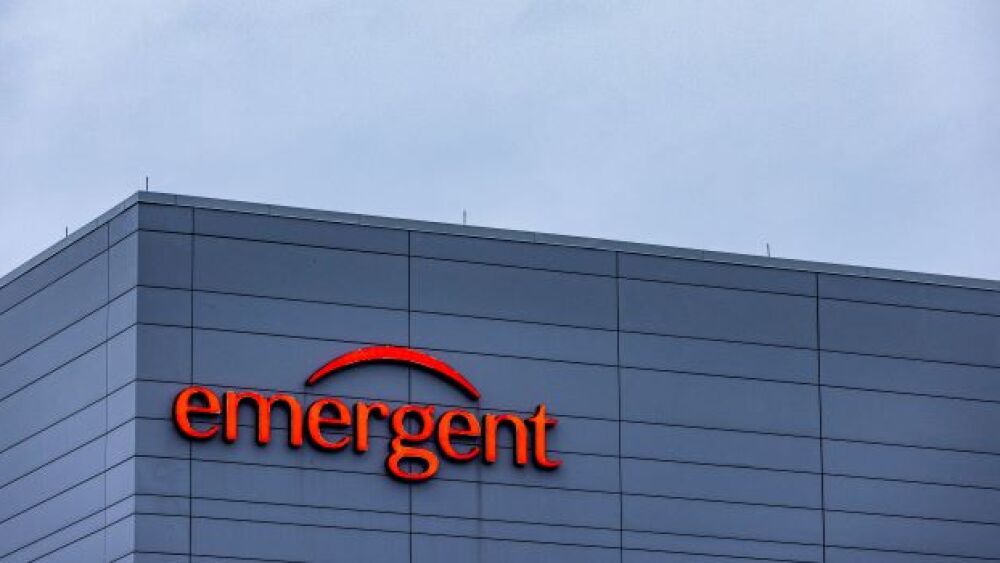Gaithersburg, Md.-based Emergent BioSolutions offered an update on its Phase III trial of SARS-CoV-2 Immune Globulin Intravenous (Human) (COVID-HIG) to treat hospitalized patients with COVID-19.
Tasos Katopodis/Getty Images
Gaithersburg, Md.-based Emergent BioSolutions offered an update on its Phase III trial of SARS-CoV-2 Immune Globulin Intravenous (Human) (COVID-HIG) to treat hospitalized patients with COVID-19. Unfortunately, the ITAC trial showed that the addition of the treatment to Gilead Sciences’ remdesivir, did not provide clinical benefit compared to standard of care plus placebo in hospitalized adult COVID-19 patients with symptoms for less than 12 days. No safety issues were raised.
“While we are disappointed by these data in hospitalized patients where there remains a high unmet need, we recognize that similar to other antibody-based therapies, intervention with COVID-HIG earlier in the disease course may be necessary to impact COVID-19 in patients,” said Laura Saward, senior vice president and therapeutics business unit head at Emergent.
Saward went on to say, “Emergent will continue to explore COVID-HIG as a treatment in ongoing clinical trials. The public-private partnership with NIAID and the Biomedical Advanced Research and Development Authority (BARDA) has been important to generate data on the COVID-HIG investigational product. We also would like to thank all study participants, sites, and investigators across the globe who contributed to this effort.”
The therapy is also being investigated for outpatients at high risk of progression to severe disease. That program is funded by BARDA and from the U.S. Department of Defense.
The Phase III inpatient Treatment with Anti-Coronavirus Immunoglobulin (ITAC) clinical trial was sponsored and funded by the National Institute of Allergy and Infectious Diseases (NIAID). It is evaluating the safety, tolerability and efficacy of combination treatments for COVID-19, in this case, antiviral remdesivir with anti-coronavirus hyperimmune intravenous immunoglobulin (H-Ig), which is made up of a highly concentrated solution of neutralizing antibodies against SARS-CoV-2. The antibodies were derived from the liquid part of blood donated by healthy individuals who recovered from COVID-19.
Via the NIAID-funded INSIGHT network, the study enrolled almost 600 adults at 63 locations in the U.S. and 10 other countries on five continents. Eligibility was based on if they had been hospitalized for COVID-19 and had symptoms for 12 days or less without life-threatening organ dysfunction or end-organ failure.
Other companies provided investigational H-Ig materials as well, including CSL Behring and Takeda on behalf of the COVIg-19 Plasma Alliance, Emergent, and Grifols.
This is certainly more bad news for Emergent, which was in the news yesterday after a botched production for an ingredient for Johnson & Johnson’s COVID-19. J&J has a contract with Emergent for its production plant in Baltimore. The problem involved one batch of an ingredient in the vaccine. The company is part of J&J’s manufacturing network but did not yet have FDA authorization to produce part of the COVID-19 vaccine. Emergent wasn’t part of the supply chain but was scaling up to be. If the batch had been successful, it would have been used in the vaccine and distributed.
“It’s important to note that these wouldn’t be finished doses, just key ingredients ultimately bound for another facility to be put into vials and prepared for distribution,” reported NPR’s Sydney Lupkin.
The problem was first reported by The New York Times, which indicated that 15 million vaccine doses were potentially affected, although that number has yet to be confirmed by J&J or Emergent.
Apparently, there was a mix-up by Emergent between vaccine materials it is producing for both J&J and AstraZeneca.
“The two vaccines use the same technology employing a harmless version of a virus – known as a vector – that is transmitted into cells to make a protein that then stimulates the immune system to produce antibodies, The New York Times reported. “But Johnson and Johnson’s and AstraZeneca’s vectors are biologically different and not interchangeable. In late February, one or more workers somehow confused the two during the production process, raising questions about training and supervision.”
Emergent, on its part, said the quality control systems “worked as designed” to identify the issue and isolate the batch.
“There are rigorous quality checks throughout our vaccine manufacturing processes, and through these checks a single batch of drug substance was identified that did not meet specifications and our rigorous quality standards,” Emergent spokesperson Matt Hartwig told NPR. “We isolated this batch and it will be disposed of properly.”





